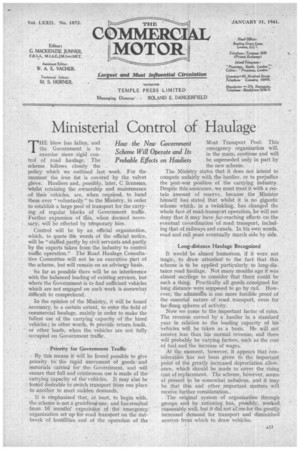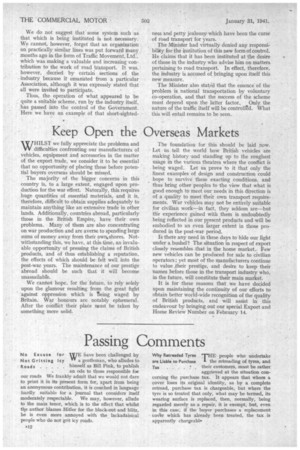Ministerial Control of Haulage
Page 13

Page 14

If you've noticed an error in this article please click here to report it so we can fix it.
THE blow has fallen, and the Government is to exercise more rigid control of road haulage. The scheme follows closely the _ policy which we outlined last week. For the moment the iron fist is covered by the velvet glove: 'Hauliers and, possibly, later, C licensees, Whilst retaining the ownership and maintenance of their -vehicles, are, when required, to hand these over " voluntarily " to the Ministry, in order to establish a large pool of transport for the carrying of regular blocks of Government traffic. Further expansion of this, when deemed necessary, will be effected by temporary hire.
Control will be by an official organization, which, to quote tile words of the official notice, will be "staffed partly by civil servants and. partly by the experts taken from the industry to control traffic operation." The Road Haulage Consultative Committee will not be an executive part of the scheme, but will remain on an advisory basis.
So far as possible there will be no interference with the balanced loading of existing services, but where the Government is to find sufficient vehicles which are not engaged on such work is somewhat difficult to comprehend.
In the opinion of the Ministry, it will be found necessary, to a certain extent, to enter the field of commercial haulage, mainly in order to make the fullest use of the carrying capacity of the hired vehicles ; in other words, tn provide return loads, or other loads, when the vehicles are not fully occupied on Government traffic.
Priority for Government Traffic By this means it will be found possible to give priority to the rapid movement of goods and materials carried for the. Government, and will ensure that full and continuous use is made of the carrying capacity of the' vehicles. It may also be found desirable to switch transport from one place • to another to meet sudden demands.
• It is emphasized that, at least, to begin with, the scheme is not a grandiose one, and has resulted • :from -16 months'. experience of the emergency organization set up for road transport on the outbreak of hostilities and of the operation of the Meat Transport Pool. This emergency organization will, in the main, continue and will be superseded only in part by the new scheme.
The Ministry states that it does not intend to compete unfairly with the haulier, or to prejudice the post-war position of the carrying industry. Despite this assurance, we must treat it with a certain amount of reserve, because the Minister himSelf has stated that whilst it is no gigantic scheme which, in a twinkling, has changed the whole face of road-transport operation, he will not deny that it may have far-reaching effects on the eventual co-ordination of road transport, including that of railways and canals. -In his own words, road and rail must eventually march side by side.
Long-distance Haulage Recognized It would be almost humorous, if it were not tragic, to draw attention to the fact that this scheme is to be applied particularly to long-distance road haulage. Not many months ago it was almost sacrilege to consider that there could be such a thing. Practically all goods consigned for long distance were suppl9sed to go by rail. However, the admissirm is one more forcible proof of the essential nature of road transport, even for far-flung spheres of activity.
Now we come to the important factor of rates. The revenue earned by a haulier in a standard year in relation to the loading capacity of his vehicles will be taken as a basis. He will not receive less than his normal revenue; and there will probably be varying factors, such as the cost . of fuel and the increase of wages.
At the moment, however; it appears that con'sideratibn has not been given to the important point of the greatly increased depreciation allowance, which should be made to cover the rising Cost of replacement. The scheme, however, seems at present to be somewhat nebulous, and it may• be that this and other important matters will receive further consideration.
The original system of organization through groups and by rationing has, possibly, worked reasonably well, but it did not al:own for the greatly increased demand for transport and diminished sources from which to draw vehicles. We do not suggest that some system such as that which is being instituted is not necessary. We cannot, however, forget that an organization on practically similar lines was put forward many months ago in the form of Traffic Movement, Ltd., • which was making a valuable and increasing contribution to the work of road transport. It was, however, decried by certain sections of the industry because it emanated from a particular Association, although it was expressly stated that all were invited to participate.
Thus, the operation of what appeared to be quite a suitable scheme, run by the industry itself, has passed into the control of the Government. Here we have an example of that short-sighted ness and petty jealousy which have been the curse of road transport for years.
The Minister had virtually denied any responsibility for the institution of this new form of control. He claims that it has been instituted at the desire of those in the industry who advise him on matters pertaining to road transport. In effect, therefore, the industry is accused of bringing upon itself this new measure.
The Minister also stat,ed that the essence of the problem is national transportation by voluntary co-operation, and that the success of the scheme must depend upon the latter factor, Only the nature of the traffic itself will be controlled. What this will entail remains to be seen.




















































